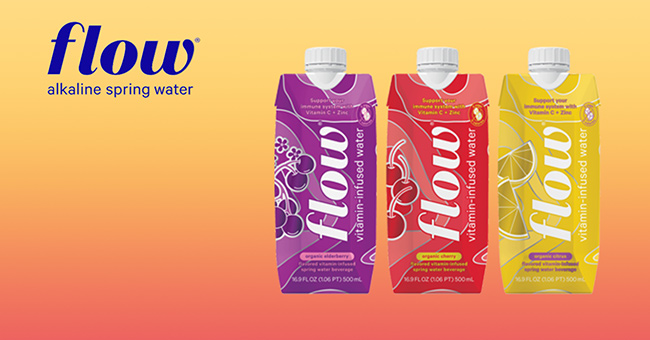As it looks to reduce cash burn and achieve profitability, alkaline water maker Flow Beverage Corp. reported record brand revenue for its flagship water line during its Q3 earnings report this week, growing consolidated net revenue 21% to CAD$10.5 million. However, those gains come against the backdrop of a 30% cut in corporate headcount and taking on more debt financing as it works to move away from vertical integration by divesting its Aurora, Toronto manufacturing facility.
Flow CEO Nicholas Reichenbach said the company is employing a four-pillar strategy to achieve profitable growth, which the staffing cuts, shift to a third party logistics model and the eventual sale of its Toronto facility will all help to achieve.
“Strategically, we feel we are in the final stages of our transition to an asset-light business model,” Reichenbach said in a statement.
The company began the sale process for its Aurora plant in April and is anticipating it will close a deal within 12 months. Reichenbach said the facility is expected to sell for a higher price than its Verona facility, noting the Aurora plant is a “profit center” with capacity to expand. The company recorded CAD$14.2 million in assets held for sale.
The company’s shift away from vertical integration has been aimed at reducing costs, as manufacturing had become a drag on the business’s finances. Last year Flow sold its Verona, Virginia facility to sports drink brand BioSteel in a $19.5 million deal. As part of the agreement, Flow has continued to manufacture its Tetra Pak packaged beverages at the plant, moving from the role of facility owner to customer while maintaining its natural spring water source.
What is unclear, however, is how the decision of BioSteel parent company Canopy Growth to cut ties with the brand might impact this manufacturing arrangement. The sports drink recently became the subject of an SEC investigation after it made “material misstatements” in its financial reporting. As well, weak sales have been a drag on Canopy’s profitability and cash flow, leading the company to announce Thursday that it will cease financing the brand as it heads toward a court-ordered sale. Canopy did not mention the Virginia facility in its announcement.
As a result of the Virginia site sale, the company reported net co-packing revenue down 19% to CAD$3.4 million in Q3 this year. Flow reported CAD$7.6 million in cash on hand and CAD$12.3 million in working capital as of July 31, up from CAD$2.3 million in cash and CAD$9.7 million in October 2022, with the payment from the Virginia divestiture helping to drive the increase.
“While not without its challenges, our operational transformation is nearly complete and the sale process for the Aurora facility is progressing well,” Reichenbach noted. “We expect the monetization of the Aurora facility will bolster our balance sheet and provide the necessary capital to position Flow for profitable growth, making this transaction a significant value unlocking milestone for Flow shareholders.”
According to the company, Flow “more than doubled” its store count in U.S. Publix stores to 1,137 locations for its 1L format and has experienced a 65% increase in velocity since Q2 2023. Its 1L Cucumber and Mint flavors are also now available in all Sprouts stores and its Vitamin line is now in over 1,100 natural and conventional channel doors nationwide.
In Canada, Flow partnered to become the Official Water Sponsor of Live Nation Canada and expanded its footprint with three new distribution partners in Ontario. The brand reported a 140% point-of-sale increase in Canadian Costco stores and has expanded its Vitamin line to Save On, Circle K Ontario, Circle K West, Circle K East & Couche Tard locations.
Consolidated net revenue was up 8% to CAD$13.8 million.
Gross margin in Q3 2023 was 21%, compared to 28% last year, impacted by what the company said was a temporary change in its sales mix favoring foodservice customers. U.S. ecommerce sales also faced disruptions in May and June, impacting the earnings.
In the release, Flow CFO Trent MacDonald said the company has a “clear path” to normalized gross margin and is still anticipating the business will reach its cost savings target of CAD$22-26 million this year.
“Part of our non-recurring costs were also incurred to support Flow’s transition to third-party logistics, a project which has been ongoing since the beginning of Q3 2023 and should be complete in Q4 2023,” MacDonald stated. “We believe our four-pillar plan can be executed without compromising our growth trajectory, although the cost savings are now expected to be realized in the fiscal fourth quarter of 2023 and into fiscal 2024.”
The quarter also saw the exit of Flow’s longtime chief revenue officer Tim Dwyer in July. Dwyer had joined the business in 2019 after a decade at coconut water leader Vita Coco and, according to his LinkedIn, he remains an advisor to Flow. Dwyer has now co-founded a non-alcoholic beer brand called Hedlum where he serves as CEO.
